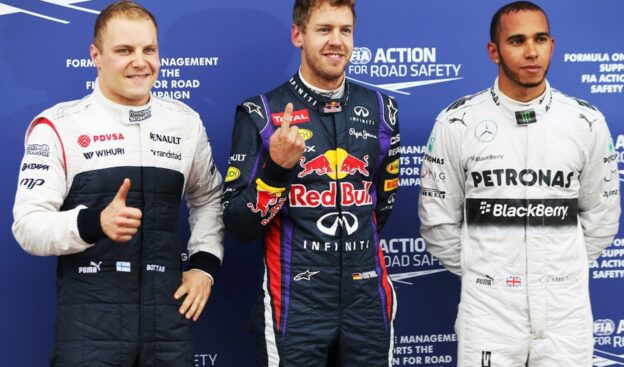2013 Canadian F1 Grand Prix qualifying report

For the second consecutive race weekend, qualifying was held in mixed conditions. Unlike the Monaco Grand Prix though, none of the drivers were able to use the slick tyres consistently, meaning that the green intermediate tyres were used almost exclusively from start to finish during all three sessions. Some drivers attempted a lap on the red supersoft – nominated together with the white medium F1 tyre this weekend – at the very start of Q1, but conditions proved to be too wet.
As FP1 and FP2 were run in wet conditions yesterday, each driver was allocated one additional set of green intermediate tyres which, however, had to be returned before the start of FP3 today.
In qualifying, Red Bull’s Sebastian Vettel set pole position on the intermediates with a time of 1m25.425s. Vettel was a consistent frontrunner in the changeable conditions, also going quickest in Q1 and third-quickest in Q2.
The final free practice session this morning was shortened to half an hour as a result of barrier repairs following an accident in an earlier support race. This session too was wet from start to finish, with Mark Webber going fastest for Red Bull on the red supersoft.
Pirelli’s motorsport director Paul Hembery said: “As has so often been the case in the past in Canada, today was all about rain: which is frequently what makes this such an exciting and unpredictable race. The key to a quick time here today was getting the speed out of the intermediates. The timing of each qualifying lap was crucial as well, with Valtteri Bottas and Williams in particular doing a brilliant job. As tomorrow now looks set to be dry, it will be interesting to see how the different strategies play out, with most drivers still having plenty of new tyres available, thanks to the mainly wet conditions up until now. In addition, the teams did not have much opportunity to run on the slick tyres so far this weekend, so they don’t have a lot of fresh data at their disposal. If it’s dry, as most people expect, the drivers can start on whichever compound they choose and this opens up the possibilities of different strategies even further.”
The Pirelli mystery strategy predictor:
The biggest influence on strategy during the Canada Grand Prix will be the weather, and of course safety cars. But if it stays dry, the fastest strategy for the 70-lap race is a two-stopper. Degradation and wear is low, despite the severity of the track, which will allow the drivers to push to the maximum from start to finish. The ideal strategy: start on the supersoft, change to supersoft again on lap 20 and then finally to the medium on lap 40.
An alternative strategy is another two-stopper, but theoretically it’s not as fast. Start on supersoft, change to medium on lap 20 and then medium again on lap 45.
Fastest compounds in FP3:
| 1. | Webber | 1m17.895s | Supersoft New |
| 2. | Sutil | 1m18.248s | Supersoft New |
| 3. | Hamilton | 1m18.732s | Supersoft New |
Top 10 tyre use:
| Vettel | Intermediate | 1m25.425s |
| Hamilton | Intermediate | 1m25.512s |
| Bottas | Intermediate | 1m25.897s |
| Rosberg | Intermediate | 1m26.008s |
| Webber | Intermediate | 1m26.208s |
| Alonso | Intermediate | 1m26.504s |
| Vergne | Intermediate | 1m26.543s |
| Sutil | Intermediate | 1m27.348s |
| Raikkonen | Intermediate | 1m27.432s |
| Ricciardo | Intermediate | 1m27.946s |
See F1 Qualifying results 2013 Canadian F1 Grand Prix.
✅ Check out more posts with related topics:















LAST 3 F1 Fan COMMENTS